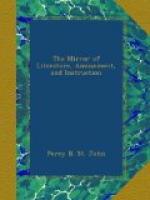Why are the English so fond of clubs, corporate bodies, joint-stock companies, and large associations of all kinds?—Because they are the most unsociable set of people in the world; for being mostly at variance with each other, they are glad to get any one else to join and be on their side; having no spontaneous attraction, they are forced to fasten themselves into the machine of society; and each holds out in his individual shyness and reserve, till he is carried away by the crowd, and borne with a violent, but welcome, shock against some other mass of aggregate prejudice or self-interest. The English join together to get rid of their sharp points and sense of uncomfortable peculiarity. Hence their clubs, their mobs, their sects, their parties, their spirit of co-operation, and previous understanding in every thing. An English mob is a collection of violent and headstrong humours, acting with double force from each man’s natural self-will, and the sense of opposition to others; and the same may be said of the nation at large. The French unite and separate more easily; and therefore do not collect into such formidable masses, and act with such unity and tenacity of purpose. It is the same with their ideas, which easily join together, and easily part company, but do not form large or striking masses; and hence the French are full of wit and fancy, but without imagination or principle. The French are governed by fashion, the English by cabal. London Weekly Review.
* * * * *
PROTESTANT BURIAL-GROUND AT ROME.
The Cemeterio degli Inglesi, or the Protestant burial-ground, stretches calmly and beautifully below the Pyramid of Cestius. The site was admirably chosen,—nothing can be more poetically and religiously sepulchral than this most attractive spot. It is worth a thousand churches. No one can stand long there without feeling in full descent upon his spirit the very best influences of the grave. The rich, red, ruinous battlements of the city, broken only by the calm and solid unity of the Pyramid; the clustering foliage beginning to brown on the ancient towers of the entrance; the deep, still, blue sky; the fluttering leaves of the vines which floated around, as one by one they dropped from the branches; the freshness of the green mounds at my feet,—these and a thousand other features, fully felt at the time, but untranslateable to writing, conveyed precisely that philosophy of Death which the poet and sculptor have more than once attempted to breathe over their most enchanting works, and which here seems an emanation from every object which you feel or see. I would place in this spot their Genius of Repose, that beautiful statue which joins its hands indolently on its head, and casts its melancholy eyes for ever towards the earth; that statue, so beautiful that it has been often confounded with the Grecian Eros, or the Celestial




